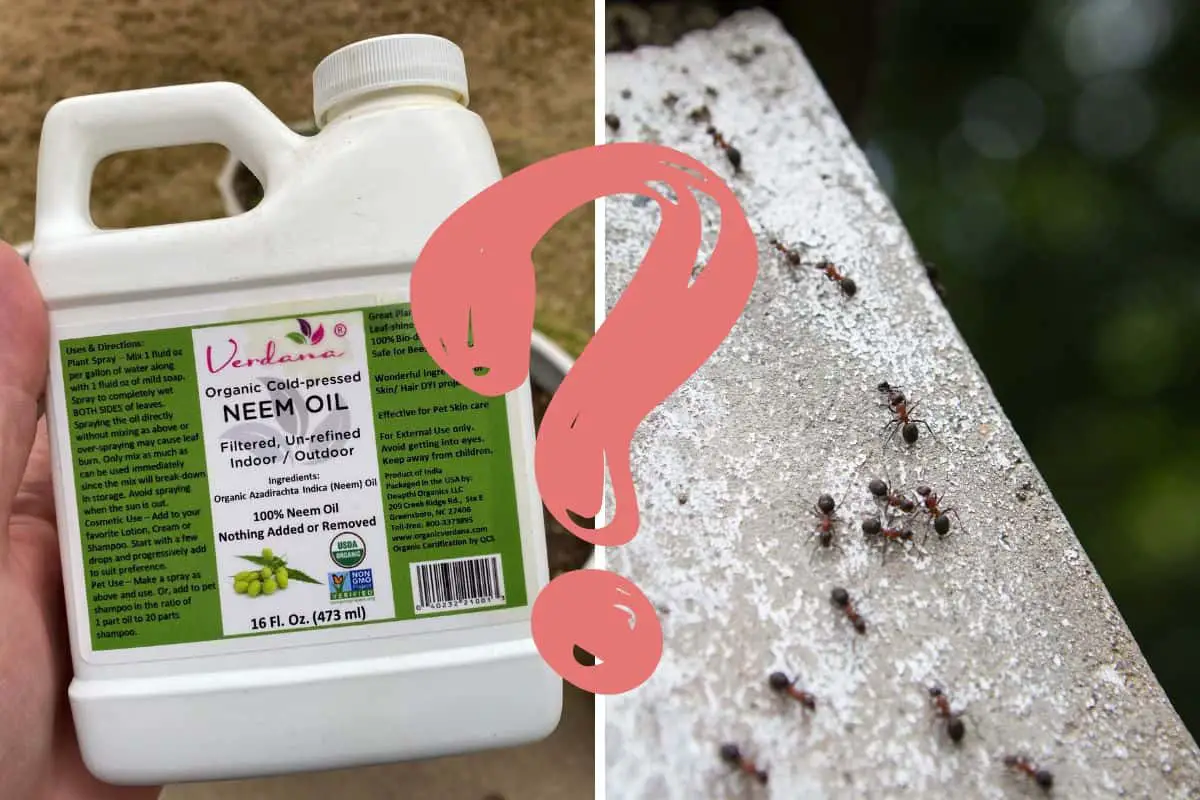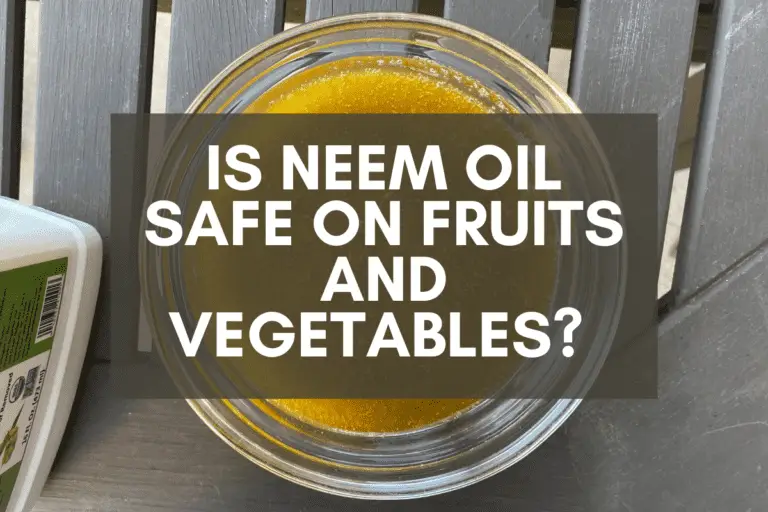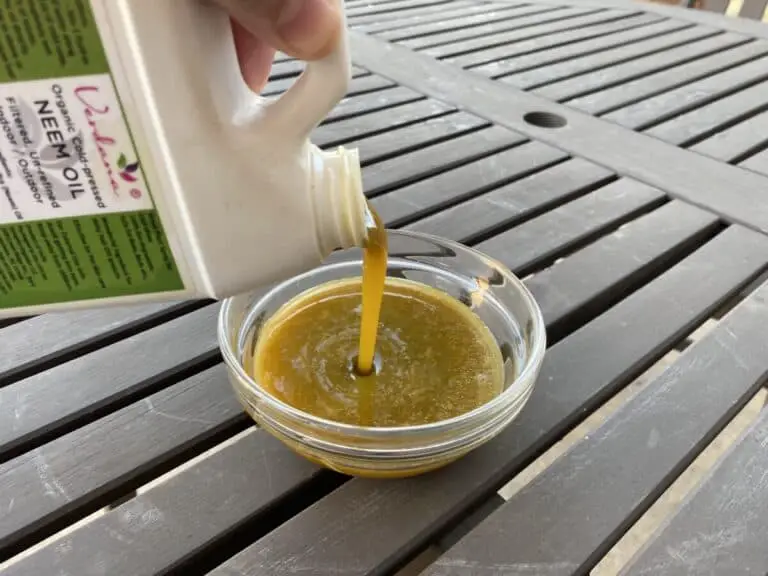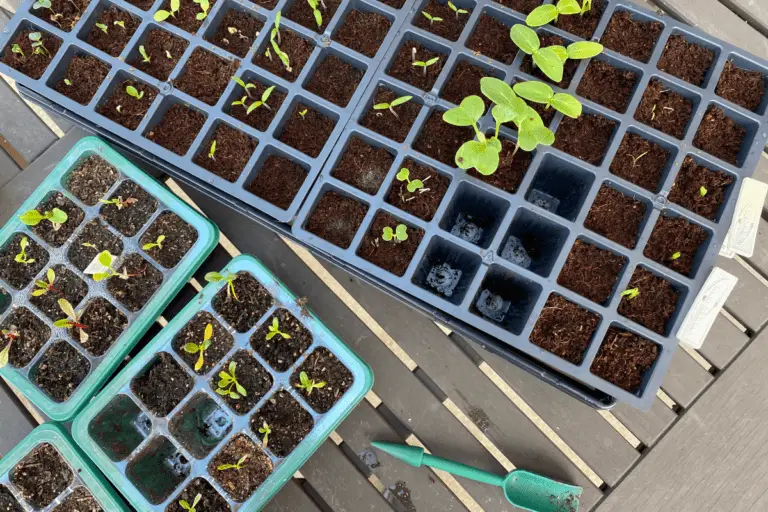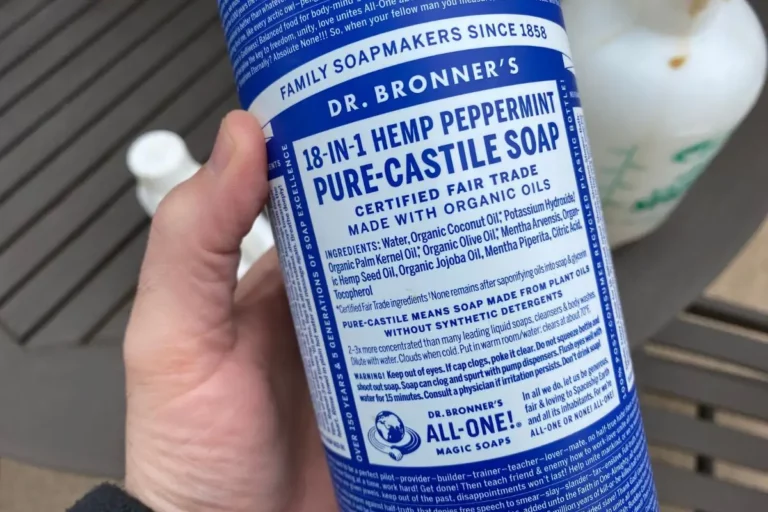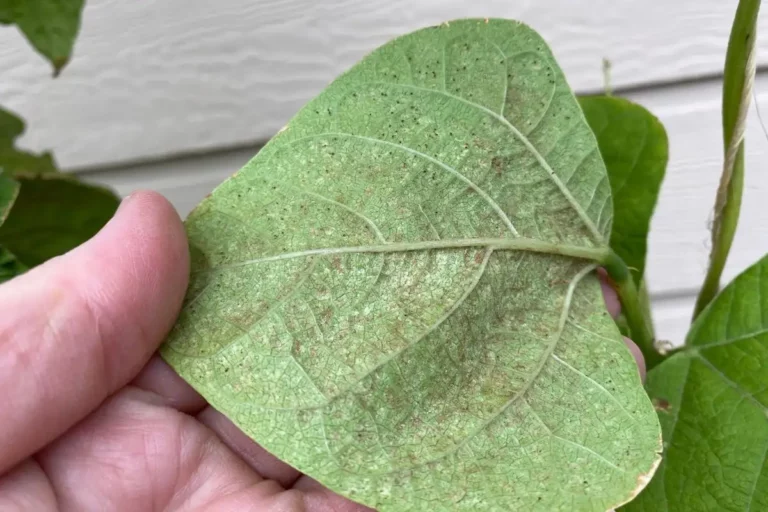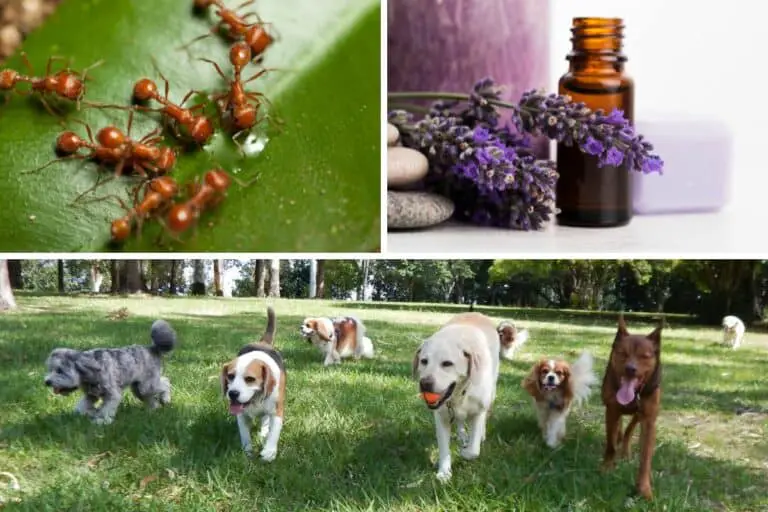Will Neem Oil Kill or Repel Ants? All You Need to Know
If you’re reading this article, you’ve likely heard of neem oil. Derived from Azadirachta indica, a tree found primarily in Southeast Asia and certain parts of Africa, neem oil is a natural insecticide that has been shown to kill off or repel literally hundreds of bugs.
But what about ants? Have you ever wondered if neem oil would take care of your ant problems?
As studies have shown, neem oil will slow down, disorient, and even kill off worker ants while decreasing the rate at which ants feed and forage. Neem oil is most effective when sprayed on ants or poured over ant mounds, but it’s also good for killing off aphids, which ants rely on for food.
I’ve been using neem oil for years, and I love it. It’s as natural an insecticide as they come, and it’s highly effective when used correctly.
But here’s the thing: It’s very easy to go wrong with neem oil, and if you do, two things could happen:
- The neem oil might not work, leaving the pests to continue destroying your garden.
- The neem oil could damage your plants, burning their foliage and even killing them under certain circumstances.
If you want to maximize your success with neem oil while also learning about the best ways to use it to repel and kill off ants, keep reading.
Below, I’ll share all I’ve learned about neem oil through years of trial and error, including the recipe I use to make my easy, homemade neem oil spray. I’ll also make sure to link to my many other neem oil articles so that you can learn everything I know about this amazing natural insecticide.
Let’s get started!
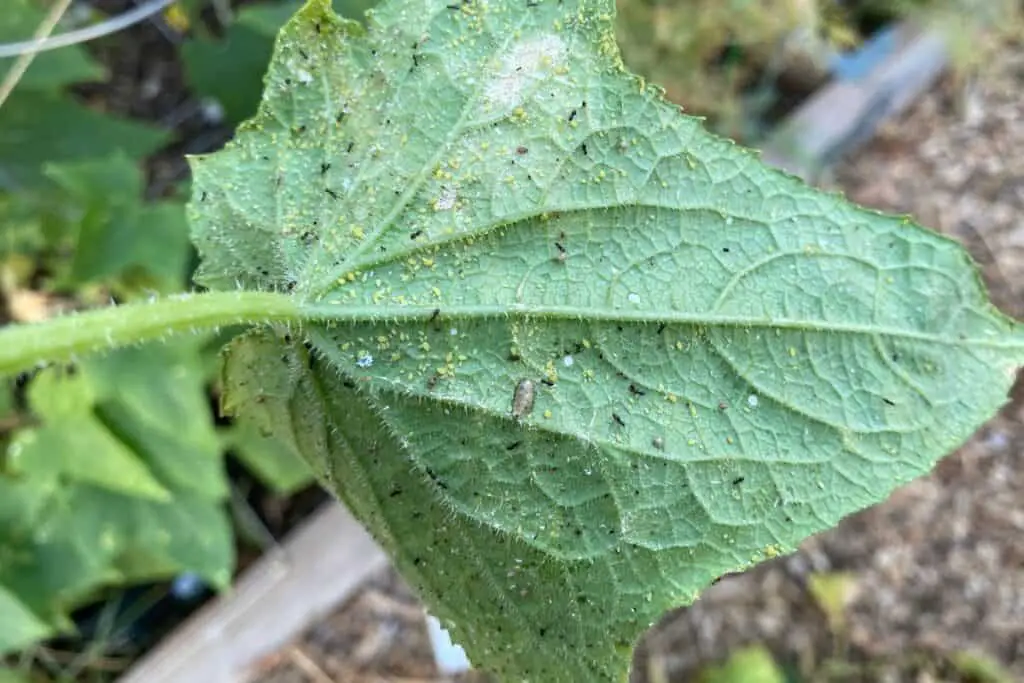
Will Neem Oil Get Rid of Ants? What Science Has to Say
As I noted above, neem oil has been shown to repel, disorient, and kill off ants.
Before I go into the details and explain my step-by-step method for making a highly effective neem oil spray, let’s take a quick moment to look at what the most recent research on the subject has to say.
(If you’re not all that interested in scientific studies, just skip this section and scroll down to find out more about how I mix and apply my neem oil spray!)
The past 20 years have witnessed an explosion in research on the subject of neem oil. In terms of neem oil’s impacts on ants, these are the studies that I found most relevant to this discussion:
- Back in 2006, researchers studying leaf-cutting ants found that neem oil was toxic to them when ingested but somewhat less so on contact only.
- A group of scientists in 2012 found that neem oil treatments repelled red ants and kept them away from beehives.
- In 2014, researchers who were testing neem oil on cotton pests noted that it didn’t seem to impact the number of ants in the testing area.
- A 2016 study found that neem oil reduced the foraging activity of leaf-cutting ants by up to 75%.
- In a 2018 study, scientists noted that neem oil repelled and killed off ants.
- Another 2018 study found that neem oil slowed down or killed off both black ants and soldier ants.
- Researchers tested neem oil on leaf-cutting ants and determined that it inhibited feeding patterns and increased the mortality rates of foragers.
With the exception of the 2014 article, each study showed that neem oil had anywhere from moderate to significant impacts on ants.
In the case of the 2014 study, the researchers weren’t focused explicitly on neem oil and ants, so I don’t necessarily think that one’s as authoritative as the others.
Long story short, neem oil is definitely useful when combating ants and ant problems, but this doesn’t mean that it’s necessarily the best product to use.
So here’s what I’d like to cover below:
- several scenarios where you might want to use neem oil to kill ants.
- steps you should take when diluting, mixing, spraying, and pouring neem oil on ants.
- other ant repellant sprays that might work better than neem oil, depending on your particular circumstances.
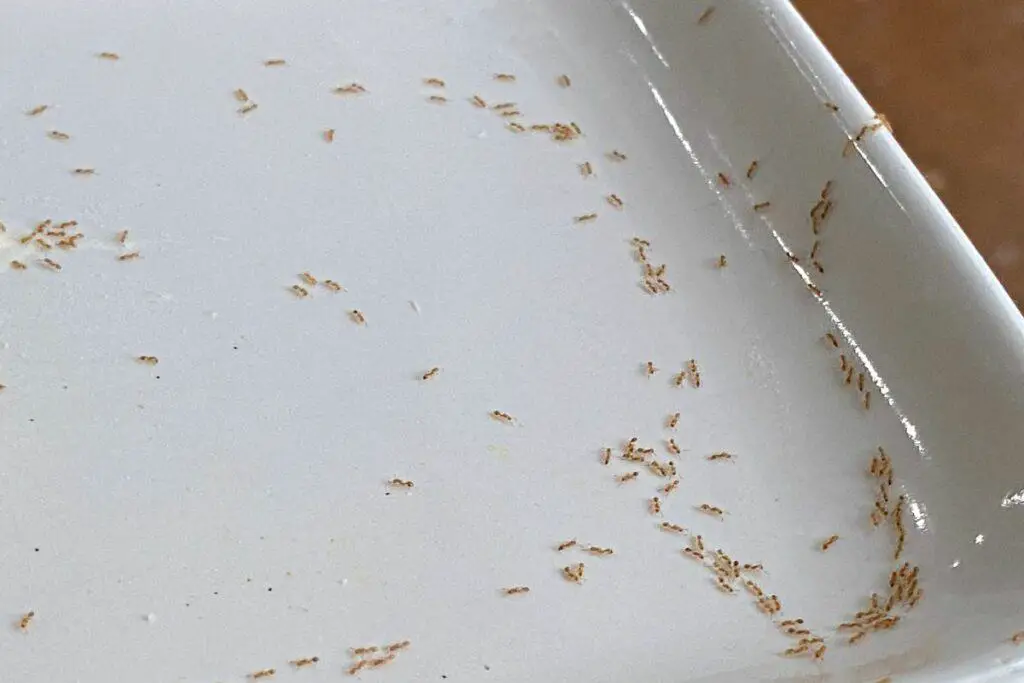
Using Neem Oil to Stop Ants: 4 Important Things to Consider
Now that you know that there’s scientific evidence linked neem oil to increased ant mortality, you need to determine whether neem oil is the right solution to the particular problems you’re having with ants.
There are many ways to kill off ants–some more effective than others–so here are some things you’ll want to keep in mind before you begin spraying neem oil on the ants crawling around your property.
1. Pick a Quality Cold-Pressed Neem Oil Product
When it comes to neem oil, you want to make sure you’re picking up a quality product. My preferred neem oils are those that are cold-pressed, not the kinds that you’ll often find marketed for health and beauty uses.
These are the neem oils that I’ve used in my garden. They both work great, as long as you store them properly, mix them well, and use them shortly after mixing.
Neem oil can last for at least 1 year if stored properly (often even longer), but once you mix it with water and a soapy emulsifier, you need to use it as quickly as possible, preferably within an hour or so.
Once it’s mixed and exposed to environmental conditions, it’ll begin deteriorating quickly.
This makes it great for the garden since you can use it before a harvest, assuming you wash your veggies off well, but it also means you can’t store mixed neem oil spray for later use. Once you mix it, you’ve got to use it.
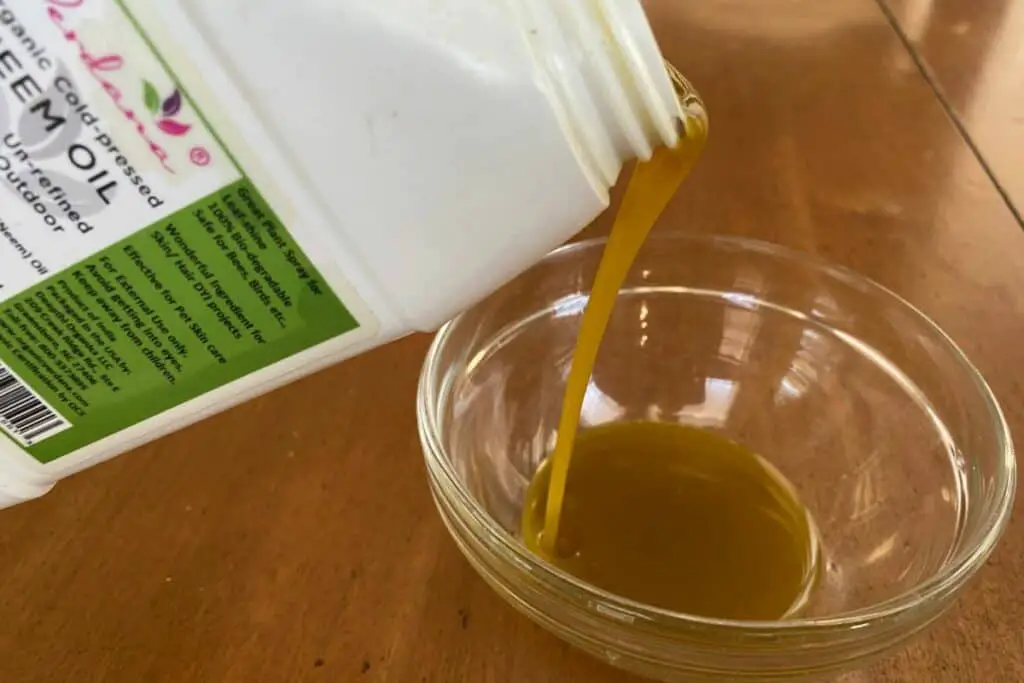
2. Use Neem Oil Outside Only
If you’re never used neem oil before, you might be surprised the first time you open the cap and get a whiff of the stuff.
Simply put, it’s stinky. Very stinky.
If you’ve got an indoor ant problem, do not use a neem oil spray. You’ll soon regret doing so.
Instead, I recommend using a natural peppermint oil spray or, if you’ve got furry friends inside the house, an ant repellent spray made of pet-friendly essential oils.
For those who’ve got a problem with indoor ants–and who don’t care whether the ant repellent product is natural or not–Terro sells some highly effective liquid ant bait stations. Simply twist off the tip (or cut it with scissors) and lay several stations near the source of your problem.
The ants will soon congregate at the station, then deliver the bait back to their point of origin, thus killing off the colony.
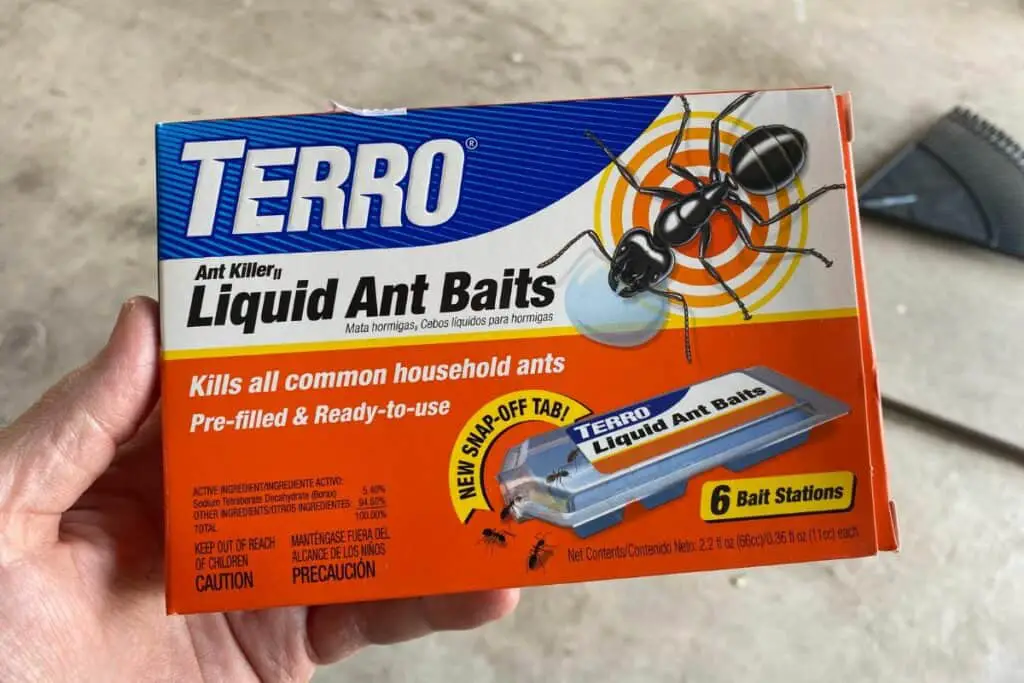
But for outdoor ant issues–and specifically problems in and among your garden plants– neem oil will work well if you follow the suggestions below.
3. Spray Neem Oil Directly on Ants
As the studies above show, ants aren’t going to eat neem oil the way they would other more desirable substances. In fact, they’re going to do their best to steer clear of neem oil due to its pungent smell.
This means that, to kill off ants, you’re going to have to spray them directly. When mixed with water and a soapy emulsifier (following my instructions below), neem oil will coat the ants in an oily, soapy film, disorienting them, interrupting their feeding patterns, and hindering their ability to forage and breathe.
The good news is that neem oil is effective when sprayed on ants directly. The bad news is that neem oil won’t, in and of itself, kill off an ant colony since the affected ants will just die. They won’t go back to the colony and infest other ants.
Because of this, you’ll sometimes need to take more aggressive measures to kill off an entire ant colony.
4. Pour Neem Oil Solution Directly on Ant Mounds
If you can see visible signs of the ant colony–the typical mound that emerges from the soil–then you can attempt a more aggressive neem oil ant treatment.
Instead of just spraying the workers and foragers, you can make your own neem oil spray and pour it directly on the mound itself. The goal in this scenario is to pour the mixture slowly and get the neem oil as deep into the colony as possible, hopefully killing the queen in the process.
Please remember to take particular care if you’re ever applying a neem oil soil drench in or around your garden area.
The good news is that neem oil won’t kill off earthworms or pill bugs as long as they aren’t in the path of the initial drench. The same goes for pollinators, helpful predators such as ladybugs and even beneficial nematodes.
Thankfully, it’ll kill off all kinds of garden pests: aphids, armyworms, spider mites, juvenile stink bugs, and white flies, to name a few.
The bad news is that neem oil drenches aren’t necessarily 100% effective against ants and ant colonies since they must reach the queen to get rid of the colony.
If you plan to drench an ant colony in a neem oil mixture, use the suggested recipe found below and start off small, especially if the colony is in or near a garden bed. Begin with an 8- to 12-ounce mixture (roughly 1/4 to 1/3 liter) and slowly pour the mixture over the ant mound.
If the mound is still there 2-3 days later, try doubling the amount and see what happens next. If the mound persists despite the neem oil soil drench, you might want to take a close look at your nearby plants to make sure that ants aren’t entrenched in your garden for a reason.
If you’d like to do a deep dive into the ins and outs of applying neem oil in your garden, check out these related articles:
- Neem Oil Plant Burn: Why It Happens + How to Avoid It
- Washing Neem Oil Off Vegetables: Do This Before Eating
- Why Do Insects Hate Neem Oil? 12 Secrets to Its Success
- Will Neem Oil Kill Herbs? Consider This Before Spraying
5. Use Neem Oil Spray to Kill Off Ants’ Food Sources
Last year, I saw ants crawling all over an area of my garden where I had been growing beans, lettuce, peppers, and spinach. When I saw that, I was almost 100% sure I knew the cause: aphids.
Ants love aphids. But it’s not aphids per se that ants love. Instead, ants love the sugary honeydew droplets that aphids leave behind as they feast on your plants.
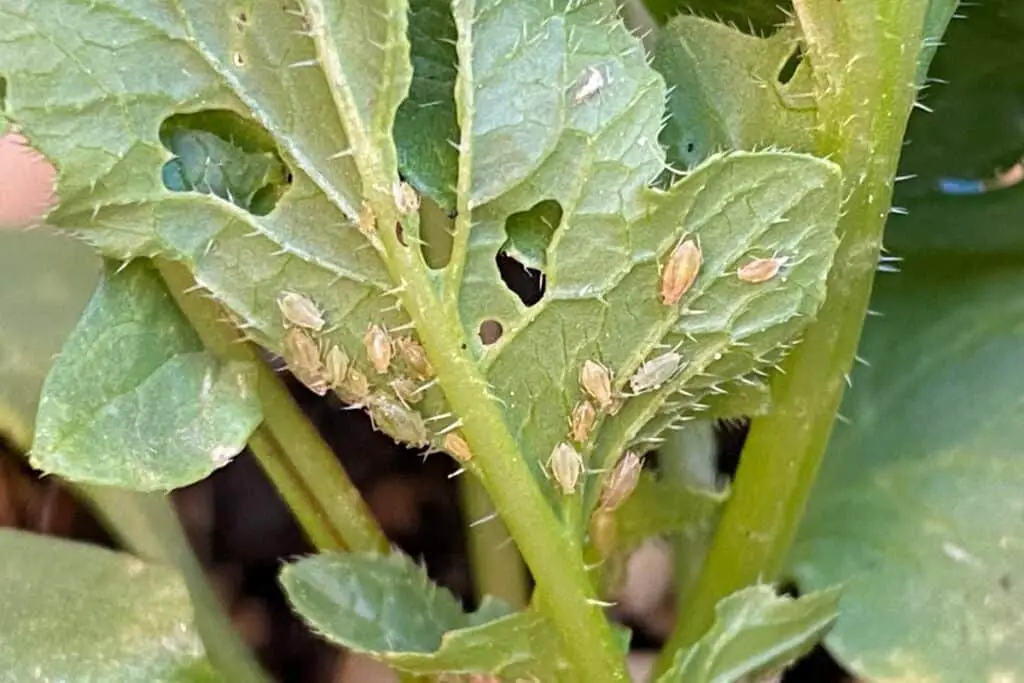
As aphids spread from plant to plant–and as their population survives intact through adverse weather conditions and even the cold winter months–they’ll ensure that ants remain interested in living as close to your garden plants as possible so as to be as close to the aphids as possible.
In other words, if you’ve got aphids in your garden, you’ll likely have ants as well since ants will do everything in their power to nurture and protect aphids.
If neem oil isn’t really helping with your ant problem, you might be treating the symptom instead of the underlying cause. Take care of your aphid problem, and you might just take care of your ant problem as well.
Read over these articles if you’d like to learn as much as possible about killing off aphids in your garden:
- 21 Plants That Aphids Love to Attack + How to Stop Them
- Are Aphids Good or Bad? Everything You Need to Know
- Can Plants Recover from Aphids? Tips to Save Your Plants
Killing Ants with Neem Oil: My Recipe and Application Schedule
When it comes to killing ants with neem oil, I use the exact same recipe that I use when killing other garden pests.
Here’s the recipe:
- 1 gallon of water (3.8 liters)
- 2 tablespoons (30 ml) of neem oil
- 1 tablespoon (15 ml) of castile liquid soap
I’ve used Verdana and Neem Bliss with lots of success, so these are the products I recommend.
In terms of castile liquid soap, my all-time-favorite soap is Dr. Bronner’s Peppermint Castile Soap.
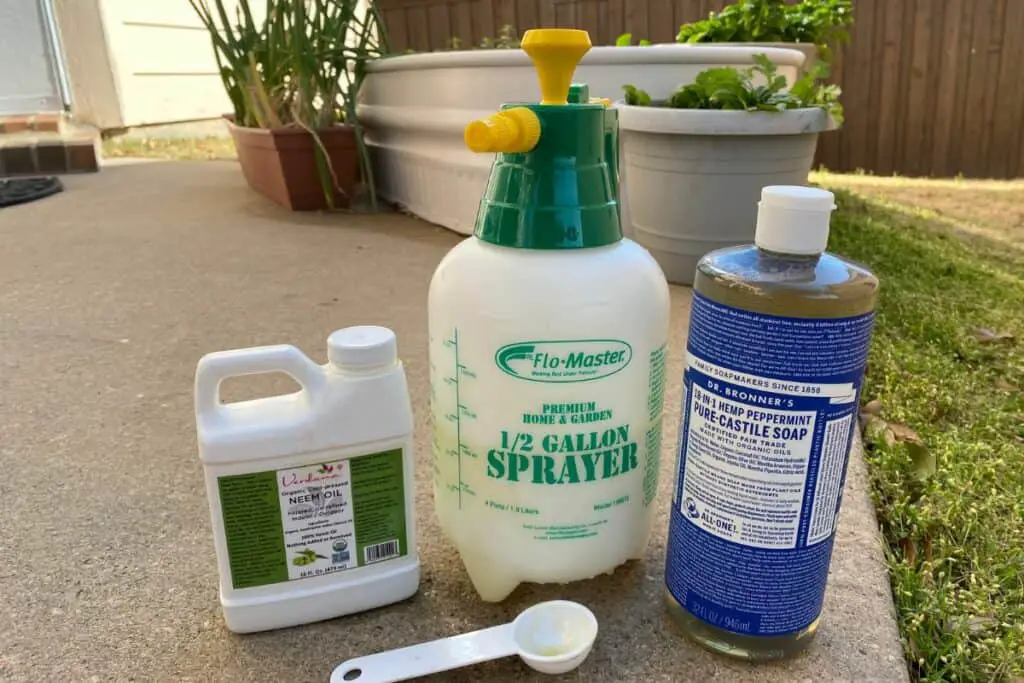
For ant mounds, I don’t see any reason to make an entire gallon of neem oil spray. You could easily cut the recipe in half, which would give you these amounts:
- 1/2 gallon of water (1.9 liters)
- 1 tablespoon (15 ml) of neem oil
- 1/2 tablespoon (7.5 ml) of castile liquid soap
In terms of my application schedule, this entirely depends on the scale of the infestation.
For smaller problems, I might try applying neem oil once directly to a mound to see what happens. But for larger issues, I might apply neem oil on Day 1, apply one of the alternative methods listed below on Days 2-4, then apply neem oil again on Day 5, repeating as necessary until the ants are gone.
Just be careful when using neem oil on your plants. If you apply it anytime other than later afternoons or early evenings, you risk burning your plants.
Check out some of the detailed advice I’ve shared about neem oil in these related articles:
- Don’t Use Neem Oil on These Garden Plants
- How Can I Make Neem Oil More Effective? My 10-Step Process
- How Long Does It Take for Neem Oil to Kill Bugs?
- Using Neem Oil on Tomato Plants: An Easy, Step-by-Step Plan
8 Natural Ways to Get Rid of Ants in Your Home or Garden
The good news about ants is you’ve got more options available to you than neem oil. If neem oil doesn’t work as well as you want it to–or if you need something you can safely spray both indoors and outdoors–take a look at these natural ant repellents.
| Method | Suggestions |
|---|---|
| Baking Soda | If mixed with powdered sugar, baking soda will kill ants when ingested. Combine 1 part baking soda with 1-2 parts powdered sugar. |
| Borax | Combine 1 part Borax with 2-3 parts powdered sugar, then spread around ant mounds. The ants will carry it all back to their colony, and it’ll kill all who eat it. |
| Castile Soap | Mix 32 ounces (1 liter) of water with 1 teaspoon (5 ml) of castile liquid soap, then spray directly on ants. |
| Cayenne Pepper | Same as above but add a pinch or two of cayenne pepper as well to your soap spray. |
| Diatomaceous Earth | Sprinkle generously on and around ant mounds as well as any areas where ants seem to be congregating. |
| Insecticidal Soap | Mix up a soapy spray following manufacturer directions, then apply as needed directly on the ants. |
| Lemon Juice | Mix 1 part lemon juice with 1 part water, then spray on and around ants to get rid of their scent trails. |
| White Vinegar | Mix 1 part white vinegar with 1 part water. Spray on ants directly, on and around ant mounds, and anywhere you’ve seen ants to kill and disorient them. |
I’ve discussed these methods in articles on getting rid of ants with essential oils and keeping ants off your pepper plants. Some of them work better outside while others are easiest to use indoors.
Whatever you do, these are all good options if you’re trying to get rid of ants naturally, and you can use them alongside neem oil treatments for an extra strength approach to repelling and killing off ants.
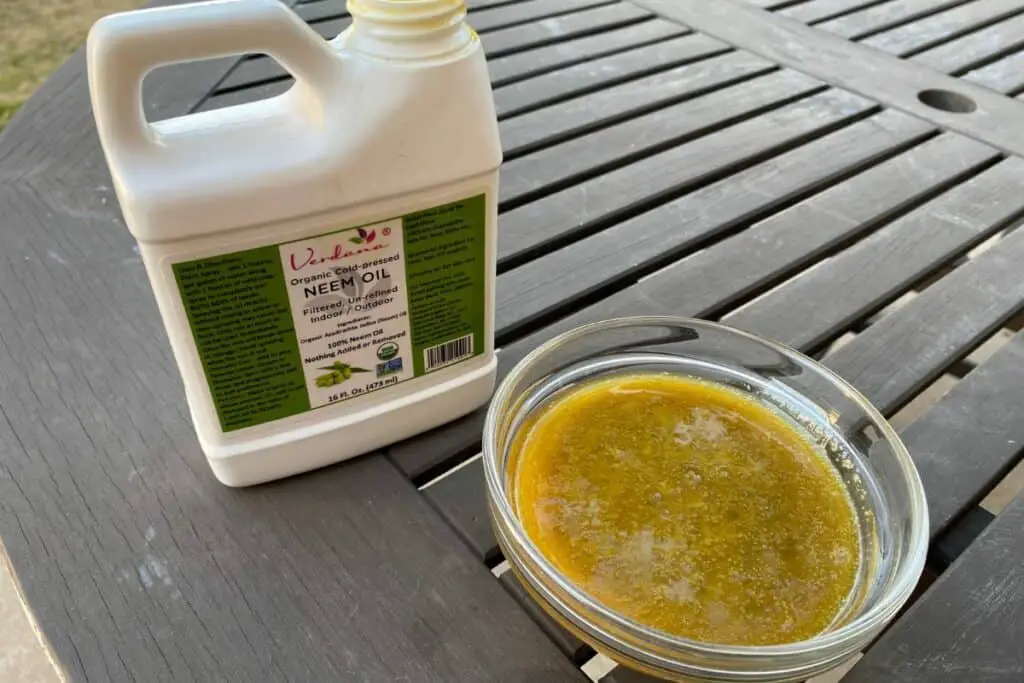
How Long Does It Take for Neem Oil to Kill Off Ants?
Contrary to what some websites imply, neem oil usually doesn’t kill insects on contact (unless you happen to include quite a bit of liquid soap in your mixture).
Generally speaking, neem oil will kill off ants in a few hours if sprayed directly on them, coating their exoskeletons in an oily substance that’ll disorient and suffocate them. Otherwise, it can take up to 2-3 days for neem oil to disrupt ants’ eating patterns and foraging habits.
Here’s what neem oil does to insects that get it inside their bodies: Neem oil’s primary chemical component (azadirachtin) begins causing biological malfunctions, usually within the span of a few days. In turn, these malfunctions cause the bug to eat less, stop reproducing, and die shortly thereafter.
In other words, don’t expect immediate results from neem oil. If you’ve got an aggressive ant infestation outside, I recommend taking a neem oil approach but complimenting it with one of the helpful, additional methods listed below.
When you do so in conjunction with getting rid of any nearby aphids, you’ll make it so that your garden is no place that ants want to be.
Additional Information
If you’re like to learn more about ways to use neem oil in and around your garden, check out these articles for further insights:
